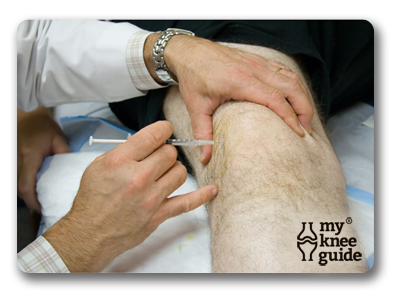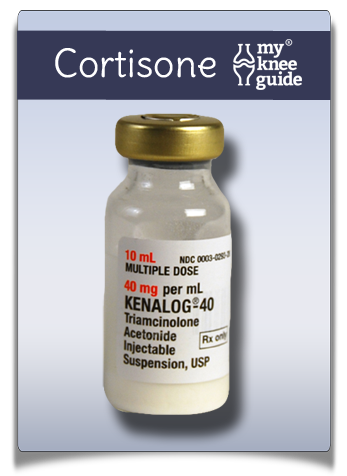

Cortisone (or steroid) injections are commonly used to treat the symptoms of knee arthritisknee arthritis. Cortisone will not re-grow cartilage or repair damaged cartilagecartilage, but may be successful in reducing pain associated with knee arthritis. Typically cortisone is mixed with an anesthetic medicine like Lidocaine® or Marcaine®. Additionally, most surgeons will numb the skin prior to the injection. This can be done by injecting a local anesthetic as is shown in the picture. Some surgeons will use an Ethyl Chloride spray to achieve a similar effect.

Typically a cortisone injection will work quickly, but in some patients it may take a couple of days or longer to get a full effect. Patients with diabetes need to monitor their blood sugar to make sure it does not become elevated following a cortisone injection. Compared to well controlled diabetics, patients who have poorly controlled diabetes (Hemoglobin A1c greater than 7%) experience greater and more prolonged increases in blood glucose elevationsgreater and more prolonged increases in blood glucose elevations after steroid injections. This blood sugar elevation is transient and does not last longer than 5 days.

When a patient has his/her first cortisone injection, there is no accurate way to predict how long the pain relief will last. It is not uncommon to hear that an injection will last for three months; however, there is significant variability from patient to patient. Generally, patients with mild or moderate osteoarthritis will have a longer period of relief from the injection.

The success of the first injection is a good predictor for future injections. Typically, the second injection will give a similar or shorter period of relief. Unfortunately, as multiple cortisone injections are performed the length of time of efficacy will sometimes shorten.
Most surgeons will not repeat a steroid injection until 3 months has passed. Many steroid injections over time will cause a crystalline build up in the lining of the joint and will even wear down the remaining cartilage quicker.
It is also imperative to be cautious about having a cortisone injection done if you are planning on having knee replacement surgeryknee replacement surgery soon. In general, every time a cortisone injection is performed, there is a miniscule potential for developing an infection within the knee. However, studies have found that by having a recent cortisone injection prior to knee replacement creates definite increased chances of developing an infection after surgeryinfection after surgery . This increased risk is present for injections that are given 3 months prior (and perhaps even up to 7 months prior11) to having surgery.22














